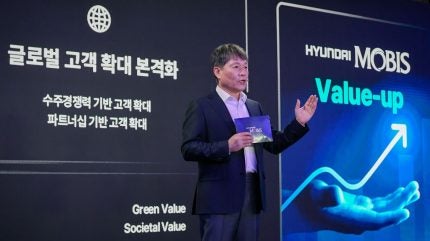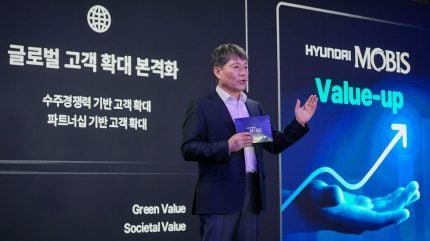
Hyundai Mobis Company, South Korea’s largest automotive parts producer, outlined its mid-term strategy in light of the slower-than-expected in the global battery electric vehicle (BEV) market. At this year’s CEO Investor Day in Seoul this week, the company confirmed it will focus more on improving earnings and on supplying more advanced technologies.
Hyundai Mobis said it is targeting an average operating profit of between 5% and 6% in the three years to 2027, up from 3.9% last year. To help it do this, it aims to reduce its dependence on its parent Hyundai Motor Group.
Hyundai Mobis has set a conservative annual revenue growth target of 8% for the three-year period, however, compared with 14% growth in 2023. The company generated sales of KRW59trn (US$42bn) last year and an operating profit of KRW2.3trn.
The company also confirmed plans to raise the share of new component supply deals with overseas automakers to 40% by 2033, up from the current 10%. Last year around 90% of the company’s revenues came from its Hyundai Motor and Kia Corporation affiliates.
Hyundai Mobis is also adopting a more aggressive shareholder return policy by targeting a total shareholder return (TSR) of over 30% for the next three years, which is more in line with Hyundai Motor and Kia Corporation, from the current 20%.
Hyundai Mobis’ CEO Lee Gyu-suk said in the statement: “We are targeting to become the world’s No. 3 auto parts maker by 2033, based on a profit-focused, qualitative growth strategy – driven by higher demand for our value-added core auto components.”
Access the most comprehensive Company Profiles on the market, powered by GlobalData. Save hours of research. Gain competitive edge.

Your download email will arrive shortly
We are confident about the unique quality of our Company Profiles. However, we want you to make the most beneficial decision for your business, so we offer a free sample that you can download by submitting the below form
By GlobalData
To help improve profitability, the company said it will continue to invest in automation, electronic component production and vehicle chassis safety systems, preparing for the new era of software-defined vehicles (SDVS). It said it will “preemptively” develop a new powertrain system for extended range electric vehicle (EREV), in line with Hyundai Motor Group’s plans to mass-produce EREVs starting from 2026.
Hyundai Mobis said it plans to expand its range of electric drive systems to include an “affordable” 120 kW-class system by 2025, targeting also compact EVs produced in Europe and India. The new drive system, which is expected to 70% cheaper than the current 160 kW-class systems, is expected to increase the company’s share of the global BEV drivetrain systems market.
Lee Gyu-suk also confirmed his company is close to completing the development of a 250 kW-class electric drive system for large EVs and that the company is already in talks to supply the system to global automakers.

